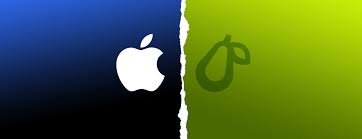Can Apple war Pears on being Conceptually Similar? A Significant IP Dispute

Trademarks are an essential type of Intellectual Property Rights for both business as well as consumers. A trademark tends to differentiate between related products and services such that businesses can build its own brand and customers can take educated decisions in exchange. This helps the business to stand out from competition in the market ecosystem.
Apple established in the year 1976 is one of the most valued firms established by two influential entrepreneurs Steve Jobs and Steve Wozniak. It has fought to defend its brand name by filing various cases against similar trademarks.
It successfully challenged multiple trademarks containing fruit-related logos. These few opposition cases help us to understand how important is it to defend our Intellectual Property Rights related to Trademark?
Apple and Pear: USPTO Case
The USPTO in the case of Apple Inc v.s Super Healthy Kids, Inc. regarding trademark no. 87315348.
Apple has filed an opposition against pear logo which was registered under NICE Class 42 (Research and Development) and Class 45 (Social and Legal Services). This trademark of the claimant is in a pear pattern with a right angle leaf. The image according to Apple’s claim is similar to its Apple logo which has made a similar commercial impact on the people.
They further claimed that the image dilutes the prestige of the Apple brand; in addition to this, it even causes confusion in the mind of a prudent Individual.
Apple and Pear: European Union Case
Recently in European Union, another case which involved Apples and Pears was dismissed by the European Union Court.
Apple has filed an opposition against another pear logo which is registered under NICE Class 9 (Electric and Scientific Devices), 35 (Advertising and Business) and 42 (Research and Development).
The European Court held that there is so slight similarity, the court made it clear that apples and pears are not comparable with each other.
The trademarks in question would immediately be perceived as different fruits, and shapes of the figurative elements and the fruits; depicted is also altogether different, the court specifies, pointing to the different representations.
Comment:
Business plans have no real value without the proper or robust policy for branding and trademarks. While Apple has a legal right to protect itself from infringement, in the above two cases it has gone way too far with the present opposition.
Just because Apple is a well-known trademark, it has no right to have a monopoly over all logos relating to fruits even if the operating line is clearly different.
Hence, Intellectual Property Right enables companies and businesses of all sizes to defend themselves from any IP infringement.